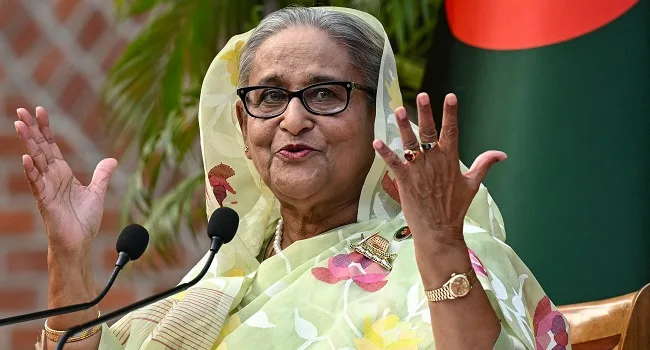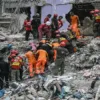Bangladesh’s fugitive former prime minister Sheikh Hasina orchestrated a “systematic attack” to suppress the 2024 student-led uprising that ended her 15-year rule, prosecutors told the International Crimes Tribunal (ICT) on Sunday.
Opening the landmark trial in Dhaka, chief prosecutor Mohammad Tajul Islam said Hasina and her top officials were responsible for a coordinated crackdown that led to the deaths of up to 1,400 people between July and August 2024, according to UN estimates.
Now 77, Hasina fled to India by helicopter as her government collapsed and has since refused to return, defying an extradition order. She remains in self-imposed exile.
“She unleashed all law enforcement agencies and armed party members to crush the uprising,” said Islam. “The evidence shows this was a widespread, coordinated, and systematic attack — amounting to crimes against humanity.”
Hasina faces five charges, including abetment, conspiracy, incitement, complicity, and failure to prevent mass murder. Also charged are former police chief Chowdhury Abdullah Al Mamun, who is in custody, and ex-interior minister Asaduzzaman Khan Kamal, who is also on the run.
Hasina has dismissed the charges as politically motivated.
The tribunal has become a focal point in Bangladesh’s volatile political landscape. The interim government, promising elections by June 2026, has vowed accountability for the uprising’s bloodshed — a key demand of rival parties.
Prosecutors presented video evidence, intercepted communications, aerial surveillance data, and witness testimonies. They allege Hasina ordered helicopter gunfire on protesters and personally sanctioned the killing of student activist Abu Sayeed, whose death on July 16 in Rangpur sparked national outrage.
The ICT also began a separate trial on May 25 against eight police officers over the killing of six protesters on August 5 — the day Hasina fled. Four of the officers are being tried in absentia.
The ICT, originally established by Hasina in 2009 to prosecute war crimes from the 1971 independence war, was long criticized for targeting her political rivals — including leaders of the now-restored Islamist party Jamaat-e-Islami.
The Awami League, Hasina’s once-dominant party, was banned by the interim government in May pending trial outcomes.
Despite the political overtones, prosecutor Islam insisted: “This is not an act of vendetta but a democratic obligation. There is no place for crimes against humanity in a lawful society.”
The trial is being broadcast live on state television.
AFP


